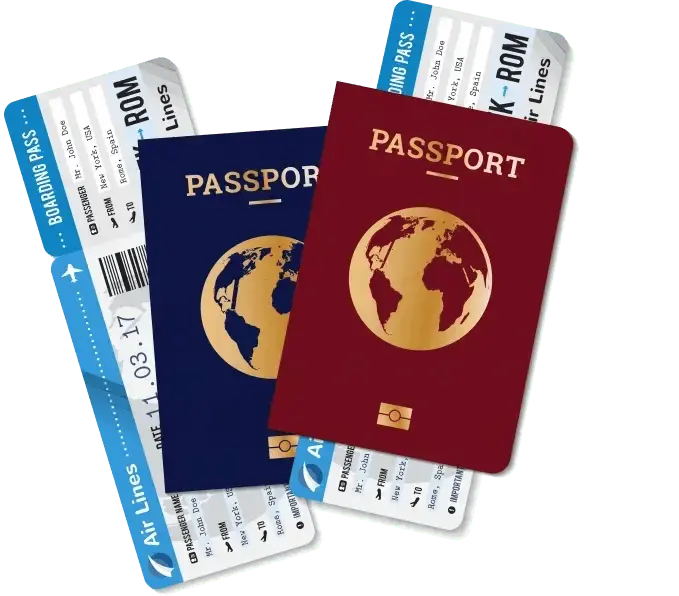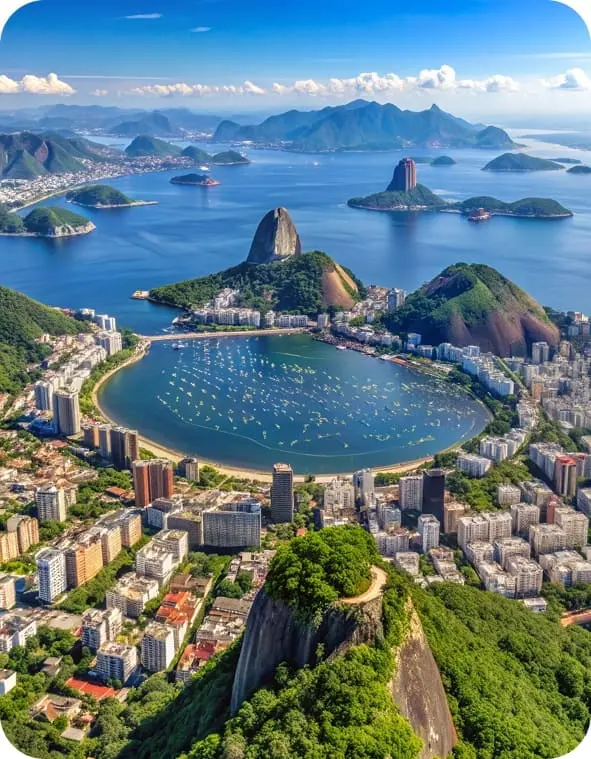Population
GDP (per capital)
Visa-Free Countries
GDP (purchasing power parity)
-
Immigrating to Brazil- 2025 updates
-
In 2025, Brazil continues to assert itself as one of the most dynamic destinations in Latin America—both for those seeking new economic prospects and for individuals drawn by its rich cultural fabric and natural beauty. With a rapidly diversifying economy, expanding digital infrastructure, and a renewed emphasis on innovation, Brazil offers fertile ground for professionals, investors, retirees, and digital nomads alike. From the cosmopolitan pulse of São Paulo and the architectural charm of Brasília, to the lush biodiversity of the Amazon and the sun-drenched coastlines of Bahia, the country’s geographic and cultural diversity is as compelling as it is welcoming.
- Main Industries
- Agriculture and Agribusiness
- Mining and Mineral Extraction
- Oil and Gas Industry
- Automotive and Machinery Manufacturing
- Food and Beverage Processing
- Textile and Footwear Industry
- Financial and Banking Services
- Tourism and Hospitality Sector

BRT (UTC−2 to −5)
8,515,767 km2
Real (R$)
Brasília
Portuguese

Visa Policy Updates for 2025
In 2025, Brazil has revised several key aspects of its immigration policy to better align with global standards and manage rising migration flows. While the country remains welcoming to legitimate long-term migrants, recent measures reflect a more regulated approach to short-term and transit entries.
Reinstatement of Entry Requirements for Select Nationalities: As of April 10, 2025, citizens of the United States, Canada, and Australia are once again required to obtain electronic visas (e-visas) before entering Brazil. This shift reverses a previous visa-free policy and introduces a system based on diplomatic reciprocity, ensuring equal treatment for Brazilian nationals abroad.
Stricter Control on Transit and Humanitarian Claims: Brazilian authorities have also increased oversight of transit and refugee entries, particularly to curb misuse by individuals using Brazil as a stepping stone to other countries. Enhanced documentation checks and entry protocols are now in place to ensure that humanitarian and asylum routes are not exploited.
Effects on Legal Immigration Pathways: These policy updates mainly affect short-term and irregular entry routes. Structured immigration pathways—such as those for employment, family reunification, investment, and digital nomads—remain fully operational and, in some areas, have even been streamlined. Brazil continues to support legal, long-term migration grounded in transparency and mutual benefit.
Temporary Visas: Building a Way In
Temporary Visas: Building a Way In
Temporary visas serve as Brazil’s main entry routes for individuals seeking to live and work in the country on a provisional basis. Among these, the Work Visa (VITEM V) remains a popular option for qualified professionals entering Brazil’s job market through formal employment.
a) Work Visa (VITEM V)
The VITEM V visa is tailored for foreign professionals with skills in demand across Brazil’s priority sectors. It enables lawful residence for those who have secured a job offer from a registered Brazilian employer.
- Who Is It For? Ideal for skilled workers and specialists in fields like technology, engineering, finance, and healthcare.
- Requirements
- Employer sponsorship is mandatory.
- The hiring company must apply to the Ministry of Justice and secure CGIG approval.
- Applicants must present relevant qualifications (degree, certifications, or proof of experience).
- Fees: Visa costs typically range from USD 100–250, depending on nationality and consular fees.
- Process Duration: The full process takes around 4 to 8 weeks, followed by Federal Police registration within 90 days of arrival.
b) Student Visa (VITEM IV)
The VITEM IV is designed for international students pursuing academic or vocational training in Brazil. Beyond its educational purpose, this visa can also serve as a gateway to future employment opportunities, as recent regulations allow eligible graduates to apply for temporary work residence after completing their studies.
- Who Is It For: This visa is ideal for foreign students enrolled in recognized Brazilian institutions—whether for undergraduate, postgraduate, technical, or language programs. It also applies to exchange students and participants in academic research.
- Requirements
- Proof of acceptance from a registered Brazilian educational institution.
- Evidence of sufficient financial means to support living expenses.
- Health insurance valid in Brazil.
- Clean criminal record and valid passport.
- Fees: Application fees typically range between USD 90–150, depending on the applicant’s country of origin and the consular jurisdiction.
- Process Duration: Processing usually takes 3 to 6 weeks, but timelines may vary. After arrival, students must register with the Federal Police within 90 days and obtain their RNM (National Migration Registry).
c) Graduate-to-Work Pathway
As of October 2024, Brazil introduced a progressive policy allowing foreign graduates from Brazilian universities to transition directly from student status to a work residence permit. This initiative is designed to retain talented international students and integrate them into the local workforce for up to two years.
- Who Is It For: This pathway targets recent graduates—both undergraduate and postgraduate—who have earned their degrees at accredited Brazilian institutions and wish to pursue professional opportunities within the country.
- Requirements
- Proof of completion of a recognized Brazilian degree.
- Valid student visa at the time of application.
- Formal application for a work residence permit submitted before the student visa expires.
- A job offer is typically not mandatory but can strengthen the application.
- Fees: The fee for switching to a work residence permit generally falls between USD 150–300, varying by consulate and individual circumstances.
- Process Duration: Approval times range from 4 to 8 weeks, after which the applicant must register with the Federal Police to obtain their National Migration Registration Card (RNM).
d)Family Reunion Visa (VITEM XI)
The VITEM XI visa allows foreign nationals to join close family members who are either Brazilian citizens or legal residents. Rooted in the principle of family unity, this visa facilitates the legal stay of relatives who wish to build or maintain their lives together in Brazil.
- Who Is It For: This visa is suitable for spouses, dependent children, parents, and—in some cases—other dependents of Brazilian nationals or foreigners holding valid residency permits. It also applies to same-sex partners in legally recognized unions.
- Requirements
- Proof of family relationship (e.g., marriage certificate, birth certificate).
- If the sponsor is not Brazilian: proof of legal residency status in Brazil.
- Documents must be translated into Portuguese and, when required, legalized or apostilled.
- A signed declaration of financial responsibility from the sponsor.
- Fees: Consular fees vary but typically range from USD 100–200, depending on the applicant's nationality and the location of application.
- Process Duration: Processing times generally fall between 4 to 8 weeks, though this may vary by consulate. Upon arrival in Brazil, registration with the Federal Police is mandatory within 90 days to receive the RNM (National Migration Registration) card.
e) Working Holiday Visa (VITEM VI)
The Working Holiday Visa (VITEM VI) is a bilateral initiative that allows young adults to experience life in Brazil through short-term travel, cultural immersion, and casual employment. It’s an ideal choice for those eager to explore Brazilian society beyond tourism, while funding their stay through part-time or seasonal work.
- Who Is It For: This visa is open to citizens of Australia, France, Germany, and New Zealand, aged between 18 and 30 (inclusive). Applicants must not be accompanied by dependents and must intend to stay in Brazil for up to 12 months, without the possibility of extension or renewal.
- Requirements
- A valid passport with at least 6 months’ validity.
- Proof of sufficient financial means (typically equivalent to around USD 2,500).
- Evidence of medical insurance covering the full duration of the stay.
- A clean criminal record and confirmation of intent to return home after the visa expires.
- Fees: Visa issuance fees vary by nationality and consulate, but generally range between USD 100–150.
- Process Duration: Processing usually takes 2 to 4 weeks, though it’s advisable to apply at least a month in advance. After arrival, holders must register with the Federal Police within 90 days to formalize their residence and receive their RNM card.
f) Digital Nomad Visa (VITEM XIV)
Brazil’s Digital Nomad Visa (VITEM XIV) offers a compelling solution for location-independent professionals who wish to live in the country while working remotely for foreign companies or clients. Introduced as part of Brazil’s broader efforts to attract global talent, this visa enables remote workers to experience Brazilian life without disrupting their professional routines.
- Who Is It For: This visa is aimed at digital freelancers, entrepreneurs, and remote employees who earn a stable income from outside Brazil. To qualify, applicants must demonstrate a monthly foreign income of at least BRL 1,500 (approximately USD 300) or maintain bank savings of at least BRL 18,000.
- Requirements
- A remote employment contract or proof of freelance/entrepreneurial activity with foreign clients.
- Documentation confirming income or savings thresholds.
- Valid health insurance covering the entire stay in Brazil.
- A clean criminal record and a valid passport.
- All documents not in Portuguese must be translated and, where applicable, apostilled.
- Fees: Visa fees typically range from USD 100 to 200, depending on the applicant’s nationality and the consulate handling the request.
- Process Duration: According to reports from applicants and immigration forums, processing generally takes between 4 and 8 weeks. Once in Brazil, successful applicants must register with the Federal Police within 90 days to obtain their National Migration Registration (RNM) card.
g) Retirement Visa (VITEM XIV – Retired Resident Category)
Brazil’s Retirement Visa, classified under VITEM XIV, offers a tranquil yet well-connected lifestyle for retirees seeking to spend their later years abroad. With its warm climate, diverse regions, affordable healthcare, and welcoming culture, Brazil has become an increasingly attractive destination for foreign pensioners looking for quality of life paired with financial sensibility.
- Who Is It For: This visa is tailored for retired foreign nationals who receive a stable monthly pension or retirement income and wish to reside in Brazil either full-time or for extended periods throughout the year.
- Requirements
- Proof of a minimum monthly income of USD 2,000, sourced from a public or private pension system.
- Additional documentation proving the lawful origin of funds and long-term financial sustainability.
- Valid health insurance accepted in Brazil.
- Background check with no recent criminal convictions.
- All foreign documents must be translated into Portuguese and, if necessary, legalized or apostilled.
- Visa Features: The retirement visa is renewable and provides a clear pathway to permanent residency after a defined period of legal stay, generally four years, subject to compliance with immigration rules.
- Fees: Consular and processing fees vary, typically ranging from USD 100 to 250, depending on the applicant’s nationality and consular jurisdiction.
- Process Duration: Applications are usually processed within 4 to 8 weeks. After arrival, retirees must register with the Federal Police within 90 days to receive their RNM (Registro Nacional Migratório).
How to Apply: Common Steps
While steps may vary slightly by visa type and country, most applicants follow a similar process when moving to Brazil:
1. Submit Your Visa Application
Apply online or through the nearest Brazilian consulate. Requirements depend on the visa type—some allow digital applications, others need in-person submission. Always check the consulate’s website for current procedures.
2. Register with the Federal Police
Within 90 days of arrival, register with the Federal Police to obtain your Registro Nacional Migratório (RNM), Brazil’s official ID for foreign residents.
3. Get a CPF (Tax ID Number)
The CPF is vital for everyday tasks like opening a bank account or signing contracts. Apply through Receita Federal, select banks, or post offices.
4. Apply for a CTPS (Work Permit), If Needed
If your visa permits employment, apply for a CTPS to work legally and access labor rights and social security benefits.

Transitioning from Temporary to Permanent Residency or Citizenship
For many foreign nationals, obtaining a temporary visa is just the beginning of a longer journey toward establishing deeper roots in Brazil. The country’s immigration system offers clear and well-regulated pathways to transition from temporary status to permanent residency—and eventually, to full Brazilian citizenship.
From Temporary to Permanent Residency
Most temporary visa holders—such as those residing in Brazil for work, study, family reunification, or retirement—are eligible to apply for permanent residence after meeting specific conditions. Typically, this involves maintaining lawful stay, complying with visa conditions, and demonstrating continued ties to the country. The required period of temporary residency before becoming eligible for permanent status generally ranges from 2 to 4 years, depending on the visa category.
Pathway to Naturalization
Once an individual has held permanent residency for at least 4 years, they may apply for Brazilian citizenship, provided they meet the following criteria:
- Proficiency in Portuguese, sufficient to communicate and integrate into Brazilian society.
- A clean criminal record, both in Brazil and abroad.
- Demonstrated adaptation to national culture and civic life.
Reduced Timeframes for Certain Applicants
Shortened naturalization periods are available for:
- Spouses or partners of Brazilian citizens (typically 1 year of permanent residence).
- Foreigners who have Brazilian children, who may apply after 1 year of permanent status.
- Nationals of CPLP (Community of Portuguese Language Countries), who may benefit from facilitated procedures under bilateral agreements.

2025 Trends & New Changes
Brazil’s 2025 immigration policy reflects a shift toward balanced migration—tightening security while welcoming skilled professionals and investors.- Stricter Entry for Some Nationalities: Visa-free entry has ended for citizens of the U.S., Canada, and Australia. They must now obtain e-visas before arrival, reinforcing reciprocity and entry control.
- Tighter Control on Transit & Asylum Use: Authorities have increased scrutiny of travelers using Brazil as a stopover or claiming asylum without valid grounds. Enhanced checks aim to prevent system abuse.
- Expanded Skilled Migration Pathways: Brazil is encouraging talent-driven migration with the following updates:
- Digital Nomad Visa: Easier access, clearer income rules, faster approvals.
- Graduate Work Visa: Foreign graduates can stay and work in Brazil for up to two years.
- Investor Visas: Lower investment thresholds and faster processing, especially in tech and green sectors.
conclusion
In 2025, Brazil continues to offer diverse and structured immigration pathways for those seeking to live, work, study, or retire in the country. While recent changes—such as the reinstatement of visa requirements and stricter transit controls—reflect a more regulated approach, Brazil remains open to purposeful, lawful migration. From digital nomads and professionals to families and retirees, those with genuine intent and clear documentation will find Brazil a welcoming place to build a future, with clear routes to residency and, eventually, citizenship.
FAQ about Immigrating to Brazil
Do U.S., Canadian, and Australian citizens need a visa to enter Brazil?
Yes. As of April 10, 2025, these nationals must obtain an electronic visa (e-visa) before traveling to Brazil.
Can I work in Brazil on a student visa?
Not directly. The student visa allows study but not work. However, recent rules enable graduates to apply for a work residence permit after completing their studies.
How long before I can apply for Brazilian citizenship?
Generally, after four years of permanent residency, applicants may apply for citizenship, provided they demonstrate Portuguese proficiency and have no criminal record. Reduced periods apply for spouses or parents of Brazilians.
What income do I need to qualify for the Digital Nomad Visa?
Applicants must prove a monthly foreign income of at least BRL 1,500 (about USD 300) or have bank savings exceeding BRL 18,000.
Looking for expert visa support?
PROGRAM MATCH
Compare the different programs in a nutshell and discover their features
PROGRAM COST
Check the cost estimates for each offered program
PROGRAM MAP
Explore the power of global mobility for every passport in the world
